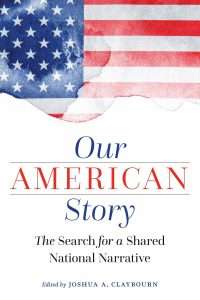The Volokh Conspiracy
Mostly law professors | Sometimes contrarian | Often libertarian | Always independent
The Declension Narrative
The sixth post in the Volokh Conspiracy symposium on "Our American Story: The Search for a Shared National Narrative" (ed. by Joshua Claybourn).

Historians are storytellers. And cultural historians often tell stories about stories. That's why writing for this project appealed to me so much.
We're a country with a lot of stories, of course. They're the product of our diverse origins and our large, geographically varied land. We're going to be a brilliant mess forever, I expect.
And what story should I tell in this cacophony? As I thought about the project I'd been invited to write for, I imagined would probably be a lot of familiar and compelling stories that various people would champion for one reason or another -- but which one would be mine? And whose story would be the truest?
Well. It wouldn't mine, anyway. I didn't even try to tell a true story. My chapter is about a certain type of false story, but one that we love to tell anyway. It's called the declension narrative. It's a familiar story, and it's always letting us down.
The declension narrative is simple to describe: There was a golden age, but we don't live there anymore. We live in a time of decay and decline, and the process of decline can at best be slowed. It cannot be stopped. The best we can hope for is to hold to the past, no matter what, even as it slips from our grasp. In every way that matters, progress is illusory, at least for us.
Humans have been repeating the declension narrative in one form or another since Hesiod and Homer, with help from Confucius, Plato, and the Buddha. Stories patterned on the declension narrative are everywhere once you start looking for them.
That might be the first clue that something's amiss: Suppose that human beings have innate cognitive biases. What would that look like? We wouldn't be able to recognize that they're wrong, because they're our cognitive biases. They look good to us, that's what makes them effective. Viewed from the inside, our cognitive biases probably look like stories that repeat themselves a lot, stories that turn up everywhere you look for them.
The truth does that too, of course, at least for some kinds of truth. Sorting the one from the other is perhaps for philosophers or psychologists, not historians. Can it really be the case, though, that the whole world has been going to hell since Hesiod? Some have thought so, including everyone from Jean-Jacques Rousseau and the Unabomber.
If you've been thinking that the declension narrative only belongs to the other guys, I'm afraid I have some bad news for you. It's all over American culture too. Oddly enough, it's on the political left as well as the political right. I'm a libertarian, and even we've told it more often than we probably should. My chapter is about a familiar story, and it's about why and how to stop telling it.


Show Comments (30)